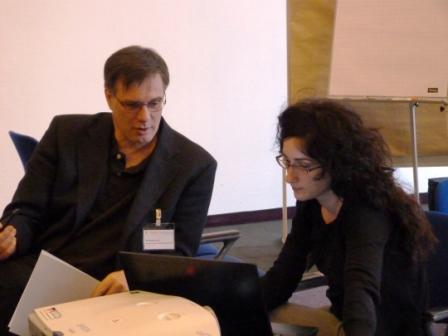Climate impacts should spur emissions curb
- Professor Wolfgang Lucht and Ioanna Mouratiadou at a session on “What’s still missing” to address climate impacts
Here in Potsdam at the Impacts World 2013, I have been searching for the links between climate impacts research and political action to curb emissions. I have talked to a lot of the scientists present from different parts of the world about this, both in the sessions and one-to-one. My concern is that the increasing focus on adaptation to cope with the effects of climate change could detract from awareness of the need for urgent political action. Professor Wolfgang Lucht , who’s in charge of Earth System Analysis at the Potsdam Institute for Climate Impacts Research PIK) and Professor of Sustainability Studies at Berlin’s Humboldt-University told me he thinks the very opposite is the case. He is convinced the evidence being amassed on the impacts of climate change will strengthen the case for stricter emissions targets. He is convinced better networking of the available data will help provide politicians with the material they need to get on with both mitigation and adaptation.
Cynthia Rosenzweig is head of the Climate Impacts Group at the NASA Goddard Institute for Space Studies. She says Hurricane Sandy was a kind of “tipping point” in awareness of the possible effects of climate change and the links to extreme weather events. She had been advising the city of New York on climate for 15 years before that. The interest, unsurprisingly, has intensified considerably.
She is also pushing very hard for better linking of different models, especially relating to the future of agriculture, and ultimately food security for the future. She introduced the conference to “AgMIP”, not a really catchy acronym, but easier than “The Agricultural Model Intercomparison and Improvement Project”. This whole conference is moving around better integration of information, better links and networks. The image of the “food web” came to me, which replaced the old “food chain”. Models at global level, domestic, regional, local, scientific bodies, ngos, governments, local authorities, have to be woven together to pool their knowledge – but in such a way that individual actors can access the info they need. A challenge indeed. There are also those here who say global scientific climate models have little relevance to adaptation to the effects of climate change on the ground. I am with Professor Lucht, who says we need the global models and the two degree target as a framework for the rest.

















